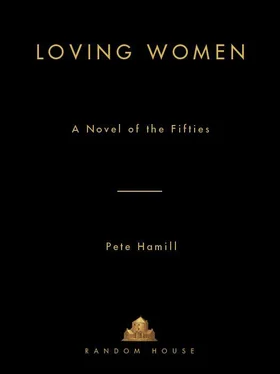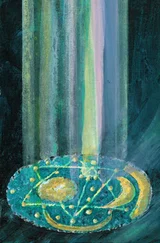“Hey, I’ll see you guys,” he said, smiling widely, waving. “I’m off.”
We went over and Mercado told us that he’d finished the helicopter training and he had his certificate, signed by Captain Pritchett and the Secretary of Defense. Now he was going back to Mexico.
“But stay in touch,” he said, and handed us each a business card, with the name of a company printed on it in Spanish, an address, a phone number. “You can get me here most of the time, if you ever come to Mexico. Actually, it’s my father’s company. But they always know where I am. Mi casa es su casa , as we say. My house is your house …”
Miles said, “If everybody you’ve invited comes to Mexico at the same time, you’ll have to rent a stadium .”
“My father owns a stadium,” Mercado said, and smiled. “So what the hell …”
We shook hands and he waved and drove on to the gate. I felt sad. Mercado was decent. He wasn’t one of those officers who acted like pricks. And then I felt a different emotion. Relief . Relief that began shifting into happiness.
Mercado was gone at last .
Now I’d never have to worry that Eden Santana was off somewhere with Mercado on the nights when I was a prisoner of the United States Navy.
He was gone .
And I was happy.
For about thirty seconds. Then a small commotion arose in me. Suppose Mercado was making one final stop in Pensacola before vanishing into Mexico and the future? Suppose the friendly goodbye was just an act, to make me relax before he went off for a few hot hours with Eden Santana on the silk sheets of the San Carlos Hotel? She might do it for one reason: curiosity . A tempting word from Roberta, who had slept with Mercado. A look at him in the passing convertible. He would be gone by nightfall anyway, and I would never know, so why not?
“Jesus Christ, what’s with you ?” Miles said. “Your face is jumping all over the place.”
“Nothing. Nothing. I was thinking about something else.”
“It must have been a bitch.”
“Yeah.”
That night, Miles had the duty in the Supply Shack. Eden was working late. I knew if I lay around the barracks my head might fill with still more unhappy visions, so I decided to work. I owed drawings to almost a dozen sailors and I needed the money. I took a nap after dinner, to store up strength for a long night’s work. I awoke in the dark. And then, my face freshly washed, I took my chalk, pad and photographs over to the Supply Shack. A soft rain was falling but there were a few helicopters in the sky. The lights burned warmly in the shack. Miles was probably busy; his bitching would be good company. Between Miles Rayfield and the work, I wouldn’t think about Eden Santana.
But when I walked into the Shack, Miles wasn’t there. Nobody was. I went to his desk and saw cigarette butts in an ashtray and a Navy white hat plunked on the chair, with Rayfield stenciled inside the brim. But there was no Miles Rayfield. I went to my desk, stared at the vapid face of a young blonde and started drawing. Then the front door opened and a mechanic walked in waving a requisition slip.
I took the slip, exchanged some small talk, and then walked to the back to find a swash plate, wondering where the hell Miles was. As soon as I stepped into the storeroom, I heard voices. Low, murmuring. Coming from the secret studio beyond the wall of packing crates. One of them belonged to Miles Rayfield. The other was the voice of Freddie Harada.
I gave the mechanic the plate and had him sign the forms, but when he was gone, I decided not to stick around. I left the signed slip on top of Miles’s hat and then packed my stuff and hurried through the soft rain to the barracks. I worked there in the dim light, sitting on my bunk, trying to draw what I could see and not what I could imagine.
At lights out, I moved into the head and kept working, sitting on a toilet seat with the drawing pad in my lap. Various sailors came in and out, handling the usual ablutions before going off to sleep. They were used to me by now; they didn’t even bother to kibitz. Then I was alone for a long time in the quiet. I was working on my third dark-eyed blonde; she was too pretty to be interesting, and blonde hair was always harder to draw than black. But the chalk worked for me; I kept repeating the tricks I’d learned from Miles Rayfield and they were beginning to feel natural.
Then I heard a screen door open and close, followed by footsteps. I looked toward the sleeping bay and saw Captain Pritchett and Red Cannon staring at me. I started to get up. Cannon took a step into the head and held up both hands, palms out.
“Stay there, sailor,” he said, his voice soft but his eyes angry. It was as if he were making an arrest. “Captain wants to talk to you.”
Pritchett stepped into the head.
“Thank you, Cannon,” he said, his voice a dismissal.
“Good night, sir,” Cannon said, snapping off a salute. He walked out quickly but was careful not to slam the door. Ass kisser , I thought. Bullshit artist . The captain waited until Cannon was gone and then he turned to me.
“So you’re the guy doing those portraits I see everywhere,” he said, looking at the unfinished drawing on my pad.
“I guess so, sir,” I said.
“They’re in lockers, the damned pictures. They’re in the hangars. They’re even turning up in officer’s country.”
I wanted to say: Yeah, so what? But I kept my mouth shut.
“And they’re not half bad,” Pritchett said.
He looked closer at the blonde on the pad.
“You got a knack , Devlin. Maybe even a gift.”
“Thank you, sir,” I said.
“ ’Course, I been around so damned long now, I’ve seen all sorts of artists come and go and come again, in this man’s Navy. Usually they pick up a discharge and go out into the civilian world thinking they’re the next Picasso. They go to art school. They try to get jobs in their art racket. And then they find out they’re not all that good, or they gotta make a living, or worst of all, they get married . And you never hear about them again. And then, a lot of times, they even re-up, come back to the Navy, where they can be big wheels again. You understand what I’m saying, sailor?”
“I think so, sir.”
“No, you don’t. You’re too damned young to understand anything.”
He sighed and then took his wallet from the back pocket of his suntans. He started flipping through a plastic insert. He took out a photograph.
“But you do have a knack,” he said, handing me a photograph of his wife, the woman whose picture was in his office. “So try this. A nice big one, if you can do it.”
“Yes, sir.”
“What do you charge?”
“Uh, well, any thing, sir. I—”
“Stop the crap, sailor. I’ll pay what the others pay. I don’t want a deal, just cause I’m your commanding office.”
“Five bucks.”
“Do a nice job and I’ll get you ten.”
“Yes, sir.”
“Good night, sailor,” he said, and turned on his heel without saluting. He walked out to where his beds of flowers were drowsing in the soft Gulf rain.
I stared at the woman’s face. A round head, crisp features, the cheeks a little dimpled, clear eyes. She was younger in this picture than in the one at his office. On the back, she had written: “For Ensign Jack Pritchett, Love Always, Catherine.”
And I thought: I’ve made hundreds of drawings of Eden Santana, but I don’t have a single photograph , nothing at all, that says on it, “Love always.” All I had was her hurried note, scribbled before she left for New Orleans. That did say love but didn’t add always . And I wondered how I would feel if Eden died on me, the way Pritchett’s wife had died on him. What would I carry around for the rest of my days that would remind me of the way love for her once drowned my heart?
Читать дальше












